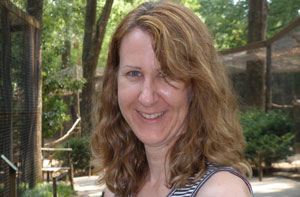
 Dr Elisabeth Liebert
Dr Elisabeth Liebert
PhD, English
Elisabeth Liebert's Master's degree led her deep into the world of John Milton, which in turn led her to Otago's John Hale, an international authority on the renaissance poet. So when she embarked on her PhD, it was her choice of supervisor that brought her – intellectually, at least – to Otago.
A single mother of two children, and based in Christchurch, Elisabeth undertook her Otago PhD by distance, working at home. “Luckily, I like working alone,” she comments. She has high praise for the Library's interloan system, and their willingness to post the books she needed. And providing for her family while living on a University of Otago prestigious scholarship gave Elisabeth the only deadline she needed. “I had to get finished in three years. There was no alternative.”
So Elisabeth's PhD on the use of direct speech in Paradise Lost became her job, “not a hobby”. She started writing on day one, and says she has at least 20 versions of her first chapter on her computer. “They mostly didn't eventuate. But it got my ideas down, it got me thinking.”
While Elisabeth may not have made it to Dunedin for any length of time, she took other opportunities to involve herself in an international community of scholars.
She is grateful for the generous travel grant that made it possible to attend a conference in France, and advises all postgraduate students to make themselves aware of the funding support that's available. Plus Elisabeth took up a Fulbright scholarship to study in Wisconsin, an experience she heartily recommends.
“It opened up entirely new perspectives on my research, and ultimately gave great depth to my PhD.”
And despite the distance between Elisabeth and her supervision team of John Hale and Lyn Tribble, she believes their unflagging support made all the difference to her thesis. “They were both excellent supervisors. I would email them work, and they would read it straight away, and provide excellent, thoughtful feedback. At my presentation at the Milton conference, John took detailed notes and we had a thorough debriefing session. I knew I was lucky. Other postgraduate students there were impressed by the level of support I was receiving.”
Nevertheless, Elisabeth urges students to be proactive about ensuring their supervisory relationship meets their needs. “Remember, it's your PhD. Go to meetings with your supervisor [prepared] to get out of them what you need. I prepared with questions I wanted to ask, and knew what direction I wanted the meeting to take to help with my thesis.”